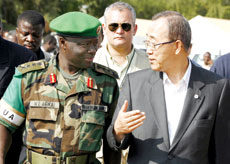EL-FASHER, Sudan, 6 September 2007 — Demonstrators greeted the UN secretary-general with pro-government slogans yesterday as Ban Ki-moon came to Darfur for a first-hand look at the living conditions of some of the 2.5 million people chased to refugee camps by the violence in this western Sudanese region.
Ban promised to step up efforts to end the four-year conflict, and urged the world to be more sympathetic to the millions of people whose lives have been uprooted.
He said the planned deployment of a 26,000-strong African Union and UN peacekeeping force in Darfur was now on a “good track” and “it is crucially important that a political negotiation process start now.” The UN chief met with officials from the AU mission currently on the ground, who told him the beleaguered force now had less then 6,000 peacekeepers deployed in this region nearly the size of France — down from its authorized strength of 7,000.
Ban was scheduled to meet North Darfur Gov. Mohamed Kebir upon arrival at the heavily guarded El-Fasher Airport, but their meeting was rescheduled to the governor’s compound. There, a crowd of demonstrators merged with the official reception and gave Ban a letter saying Darfur refugees want help from the United Nations to return to their original villages. “We are being helped by the state party,” chanted some pro-government demonstrators, who said they came from the large refugee camps that circle El-Fasher, North Darfur’s state capital.
Later, when Ban attempted to meet with delegates from the refugee camps, the demonstrators returned, this time a dozen people, mostly women, who slipped into the compound, demanded to meet the secretary-general and chanted slogans causing the meeting’s cancellation.
“We don’t care for UN! This is our country!” shouted the demonstrators in Arabic. “You want to destroy us.” Ban later went on to meet with representatives chosen by the actual inhabitants of the three camps in the area, said UN associate spokesman Yves Sorokobi.
“After the incident, they chose three leaders who then met with the secretary-general,” he said. The Sudanese government has appeared increasingly bent on reducing the population in the refugee camps, largely composed of ethnic African farmers chased from their homes by militias of nomad Arabs.


